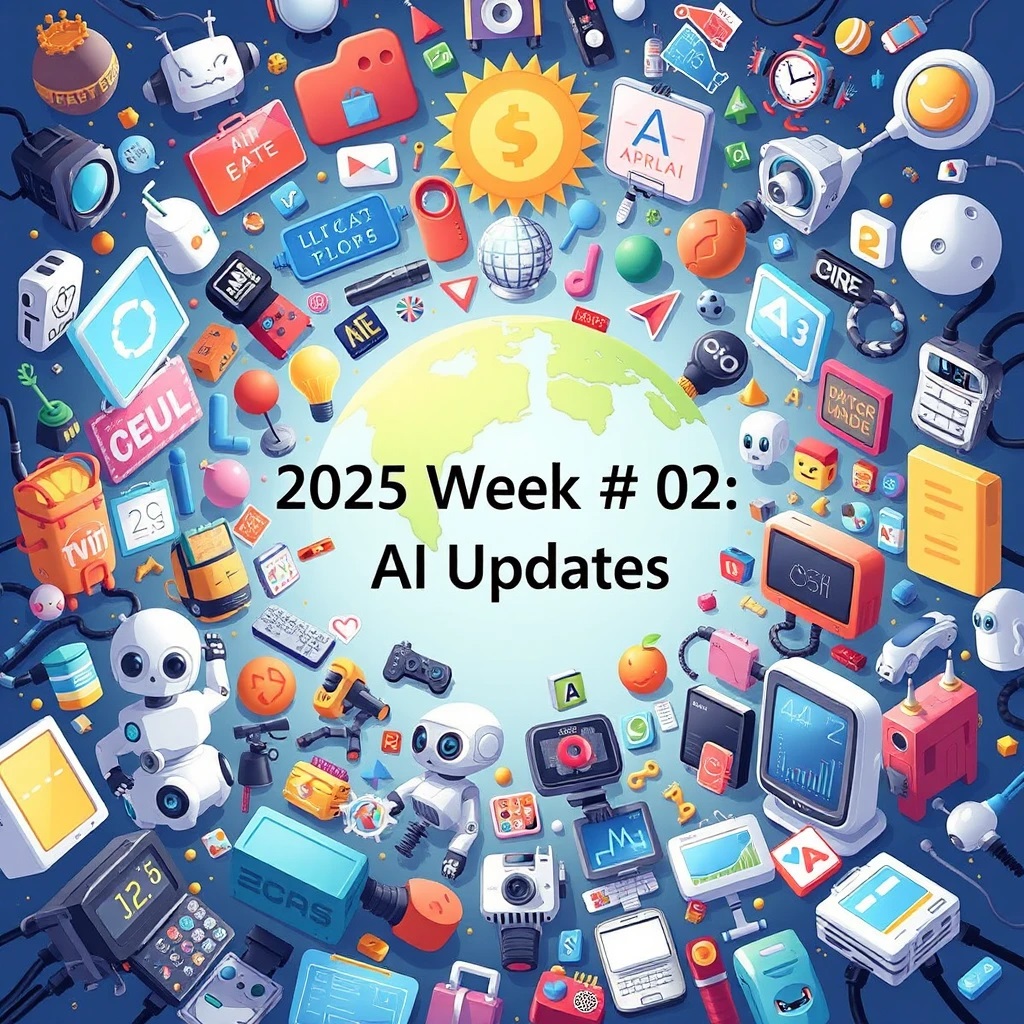Last Updated on January 15, 2025 by Editor
In the rapidly evolving world of artificial intelligence, the first week of 2025 witnessed significant development in the AI sector globally. The second week of January 2025 has brought forth a wave of exciting innovations, significant funding announcements, and crucial platform updates. As companies across various sectors continue to harness the power of AI, we are witnessing transformative changes that promise to reshape industries and enhance our daily lives. From advancements in healthcare and automotive technologies to the rise of generative AI tools, this week’s updates underscore the growing impact of AI on business and society. Join us as we explore the most noteworthy developments in the AI landscape during this pivotal week.
Key Takeaways
- Major investments in AI startups and initiatives, including Raspberry AI’s $24 million Series A funding, highlight growing interest in the sector.
- Companies like Google and Microsoft have introduced substantial updates to their AI platforms, improving functionality and user experience.
- Innovations in AI are revolutionizing healthcare, with advancements in drug discovery and diagnostic accuracy leading to better patient outcomes.
- Nvidia’s DRIVE AGX Thor showcases the integration of AI in automotive technology, enhancing autonomous driving capabilities.
- AI-driven personalization strategies are significantly boosting customer engagement and conversion rates in online retail.
- The Biden administration’s new rules on AI chip exports reflect a balancing act between innovation and national security concerns.
- The rise of generative AI tools is reshaping creative industries, enabling faster content creation and personalized marketing strategies.
- OpenAI’s advocacy for establishing AI Economic Zones aims to attract investment and foster innovation across the U.S.
- IBM’s new initiative highlights the convergence of quantum computing with AI, promising breakthroughs in complex problem-solving.
- The deployment of advanced AI chatbots is transforming customer service by improving response times and satisfaction rates.
UK Unveils £14 Billion AI Plan for Growth
The UK government, led by Prime Minister Sir Keir Starmer, has launched an ambitious AI plan backed by £14 billion from tech firms. This initiative aims to boost economic growth and improve public services, with a focus on:
Increased Efficiency: AI will streamline public sector operations, allowing professionals to focus on core duties, such as improving patient care in hospitals.
Economic Growth: AI Growth Zones will be established to accelerate infrastructure development, starting with Culham, Oxfordshire.
Technological Advancement: A new supercomputer will be developed to significantly increase the UK’s computational power.
This plan, supported by major investments from companies like Vantage Data Centres and Kyndryl, positions the UK as a global AI leader, with the potential to create over 13,250 jobs.
Bristol University’s Isambard-AI to Power UK’s AI Ambitions
The University of Bristol is developing Isambard-AI, set to be the UK’s fastest AI-dedicated supercomputer. This £225 million government-funded project aims to solidify the UK’s position as a technological leader.
Isambard-AI, operational by summer 2025, will accelerate research in fields like robotics and drug discovery. It boasts impressive processing power, capable of performing calculations in seconds that would take humanity 81 years.
Beyond research, Isambard-AI will provide a valuable training ground for students and researchers in advanced computing. Designed with sustainability in mind, it ranks among the greenest supercomputers globally. This project aligns with the UK government’s ambitious goal of significantly increasing its AI capabilities, ensuring researchers have access to cutting-edge technology to drive innovation.
Biden Administration Sets New AI Chip Export Rules
The Biden administration has introduced new restrictions on exporting advanced AI chips and proprietary model parameters to safeguard national security while fostering innovation. Commerce Secretary Gina Raimondo emphasized the need for regulation as AI’s power grows. The rules allow chip sales to allies like Australia and European nations but maintain limits on exports to China. This strategy aims to balance security with innovation, ensuring responsible use of advanced AI technologies and strengthening ties with trusted partners.
Microsoft’s $3 Billion Investment in India’s AI Sector
In a significant move to bolster India’s technology landscape, Microsoft has announced a $3 billion investment aimed at enhancing AI and cloud infrastructure. This initiative is expected to foster innovation and skill development across the region, positioning India as a key player in the global AI market. The investment reflects Microsoft’s commitment to driving digital transformation in emerging markets.
Siemens Unveils Industrial AI Tools at CES
At the Consumer Electronics Show (CES), Siemens showcased new industrial AI tools developed in collaboration with Nvidia and Sony. These tools are designed to enhance edge computing capabilities and leverage digital twin technology, which allows for real-time simulations of physical assets. This innovation is set to revolutionize manufacturing processes, improving efficiency and reducing costs.
Meta’s Shift in Content Moderation Policy
Meta CEO Mark Zuckerberg announced a major change in how the company moderates user-generated content, moving away from stringent fact-checking practices. This decision has raised concerns about misinformation but is seen as an effort to foster a more open dialogue on the platform. The implications of this shift could significantly affect how businesses engage with audiences on social media.
Global Tech & AI Awards Announced
The Global Tech & AI Awards have opened submissions for recognizing outstanding innovations within the artificial intelligence sector, encouraging companies worldwide to showcase their contributions toward advancing technology.
OpenAI Proposes AI Economic Zones to Boost U.S. Innovation
OpenAI has unveiled a blueprint to secure U.S. leadership in AI by attracting a share of the $175 billion global AI investment. The plan includes creating “AI Economic Zones” to build renewable energy infrastructure, streamline regulations, and leverage regional strengths like agriculture in Kansas and energy in Texas. The initiative aims to accelerate AI adoption across sectors while enhancing economic growth. OpenAI also advocates for stricter export controls on advanced AI models to protect national security.
Raspberry AI Raises $24M to Transform Fashion with AI
Raspberry AI, a generative AI platform for the fashion industry, secured $24 million in Series A funding led by Andreessen Horowitz, with support from Greycroft, Correlation Ventures, and angel investors like Gokul Rajaram. Collaborating with brands like Under Armour and MCM Worldwide, Raspberry AI plans to use the funds to expand its offerings and drive innovation in AI-powered creative solutions for fashion.
Google Announces Major Updates to Bard AI
Google has announced significant updates to its Bard AI platform, enhancing its capabilities in natural language understanding and generation. The new features include improved contextual awareness and support for multiple languages, making Bard more accessible to a global audience. These updates aim to position Bard as a leading tool for businesses seeking to leverage AI for content creation and customer engagement. Google’s commitment to continuous improvement reflects its strategy to remain competitive in the rapidly evolving AI landscape.
IBM Launches New Quantum Computing Initiative Focused on AI
IBM has launched a new initiative aimed at integrating quantum computing with artificial intelligence research. This project seeks to explore how quantum algorithms can enhance machine learning models and improve data processing capabilities. By leveraging quantum technology, IBM aims to tackle complex problems that are currently beyond the reach of classical computing methods. This initiative highlights the convergence of quantum computing and AI as a frontier for future innovation.
Tesla Expands Use of AI in Autonomous Driving Features
Tesla has announced an expansion of its artificial intelligence capabilities within its autonomous driving features. The latest software update includes enhanced neural networks that improve vehicle perception and decision-making processes on the road. This move reinforces Tesla’s commitment to leading the electric vehicle market through innovative technology while addressing safety concerns associated with autonomous driving systems.
Microsoft Launches CoreAI Platform
Microsoft has officially launched its CoreAI platform, a transformative initiative designed to revolutionize software development through advanced artificial intelligence capabilities. Announced by CEO Satya Nadella, this new division aims to integrate various teams to create an end-to-end AI stack that enhances developer productivity and application performance. The CoreAI platform will facilitate the development of agentic applications capable of operating autonomously across different business processes. Jay Parikh will lead this initiative, overseeing the integration of tools such as Azure AI Foundry, GitHub, and VS Code. These tools empower developers to create intelligent applications that leverage AI’s full potential. As Microsoft expands its cloud infrastructure, the CoreAI platform marks a significant step toward establishing a comprehensive AI-first application ecosystem, reinforcing the company’s commitment to innovation in the rapidly evolving AI landscape.
As we reflect on the remarkable advancements in artificial intelligence during the week of January 8-14, 2025, it is clear that the future of AI is bright and full of potential. With substantial investments fueling innovation, companies are not only enhancing their platforms but also redefining how we interact with technology in our everyday lives. As we continue to monitor these developments, we anticipate even more groundbreaking changes on the horizon. Stay tuned for our updates next week as we explore the ongoing evolution of AI and its impact on the world around us.




